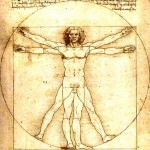October 15th, 2023
Q. Can anyone be thrown out of Judaism?

Baruch Spinoza
A. Unfortunately there are Jews who do not think, speak, believe or act in accordance with Jewish tradition and ideals, and that is certainly a pity, a tragedy, even a catastrophe… but once a Jew always a Jew.
You are a Jew because of who you are, which is basically an ethnic matter, a matter of peoplehood. Judaism is a religious culture but Jewish culture is inseparable from Jewish peoplehood. Judaism is the religion of the Jewish people.
A Jew who is disloyal is still a Jew. A Jew who does not live as a Jew is still Jewish. The rabbis of Amsterdam tried to punish Spinoza for wrong ideas but they couldn’t prevent him remaining a Jew.
The answer to your question is “No”.
 Posted by oztorah
|
Posted by oztorah
|  Ask The Rabbi, Belief, Defining Jews & Judaism |
Ask The Rabbi, Belief, Defining Jews & Judaism |  Permalink
Permalink
October 9th, 2023
 A famous interpretation of Genesis comes from Rav Joseph B Soloveitchik who says that since there are two Creation stories there could have been two Adams.
A famous interpretation of Genesis comes from Rav Joseph B Soloveitchik who says that since there are two Creation stories there could have been two Adams.
Adam I is Technological Man. He is placed there to till and toil, to exploit and utilise the earth.
Adam II is Poetic Man. Instead of a utilitarian approach (“What can I do?”) he is an existentialist who wonders what it is all about (“What am I?”) and why he is alone apart from God.
You and I are both of the Adams; our identity oscillates.
The Tosefta (quoted in the Talmud Sanh. 38a/b) asks why only one Adam was created, and it answers that it is to prevent quarrels between people. One person might say, “I have better lineage than you; my Adam was better than yours”.
One person might say he was righteous because he had a righteous ancestor; an evil person might put the blame on a wicked ancestor.
 Posted by oztorah
|
Posted by oztorah
|  B'reshit, Parashah Insights |
B'reshit, Parashah Insights |  Permalink
Permalink
October 9th, 2023
 The phrase, Tohu vavohu, comes twice in Tanach – Genesis 1:2 and Isaiah 34:11.
The phrase, Tohu vavohu, comes twice in Tanach – Genesis 1:2 and Isaiah 34:11.
It is something negative and uninspiring, often translated as “chaotic and dark”. Whatever it means, it is a rhyming, poetic doublet.
It must be a well-known ancient phrase, probably originating from another language.
A classical Hebrew lexicon suggests that the first word comes from a root that means “to rage or roar”, while the second word is from a root that means “to be void or empty”.
The basic idea is that until God created light and systematised the Creation, the universe was chaotic and lacked order.
The Almighty sorted things out stage by stage, though after Adam and Eve were thrown out of the Garden of Eden things deteriorated and became confused.
Centuries were needed before the messianic age when the world became pristine again.
 Posted by oztorah
|
Posted by oztorah
|  B'reshit, Parashah Insights |
B'reshit, Parashah Insights |  Permalink
Permalink
October 9th, 2023
 The beginning of Sefer B’reshit not only introduces the drama of the human story and the inception of the universe, but the origins of the various aspects of human civilisation – night and day, food and drink, nakedness and clothing, fertility and gender, work and leisure, technology and time-keeping.
The beginning of Sefer B’reshit not only introduces the drama of the human story and the inception of the universe, but the origins of the various aspects of human civilisation – night and day, food and drink, nakedness and clothing, fertility and gender, work and leisure, technology and time-keeping.
Not only material things but moral.
How did man and woman (and their children) develop a relationship? How did families deal with each other? Everything, including rivalry and conflict, traces back to Genesis.
A stage in moral development is the eating of forbidden fruit, which is the origin of temptation and defiance.
Humans have tested the waters, so to speak, throughout history, experimenting with every aspect of life.
What originations do we see in the forbidden-fruit story? The options of building up and pulling down, of laughter and tears.
 Posted by oztorah
|
Posted by oztorah
|  B'reshit, Parashah Insights |
B'reshit, Parashah Insights |  Permalink
Permalink
October 1st, 2023
Hoshana Rabbah, the seventh day of Sukkot, is the solemn conclusion to the month of judgment. Like Rosh HaShanah and Yom Kippur, it appeals to the Almighty to forgive us our transgressions.
Some versions of the High Holyday prayer Un’tanneh Tokef spell it out in detail when they say, “On Rosh HaShanah everyone is judged, on Yom Kippur they are inscribed in God’s book, on Hoshana Rabbah their fate is sealed”.
In the Zohar the patriarchs are each linked with the process of pardon. Isaac is regarded as the symbol of judgment whilst Abraham and Jacob represent truth.
For these reasons it is customary on Hoshana Rabbah for the melodies we use in the service to remind us of Ne’ilah, and the officiant wears his Yom Kippur white kittel.
What a pity it is that the Hoshana Rabbah services are generally so poorly attended.
 Posted by oztorah
|
Posted by oztorah
|  Festivals & Fasts, Sukkot |
Festivals & Fasts, Sukkot |  Permalink
Permalink







